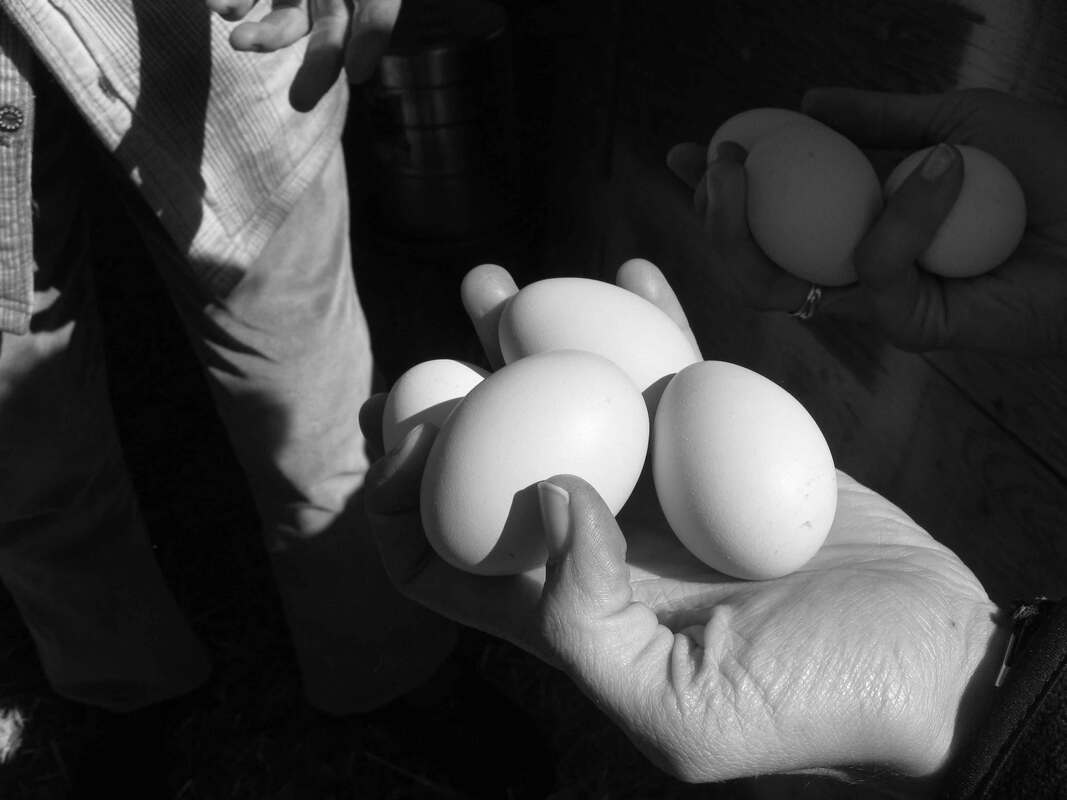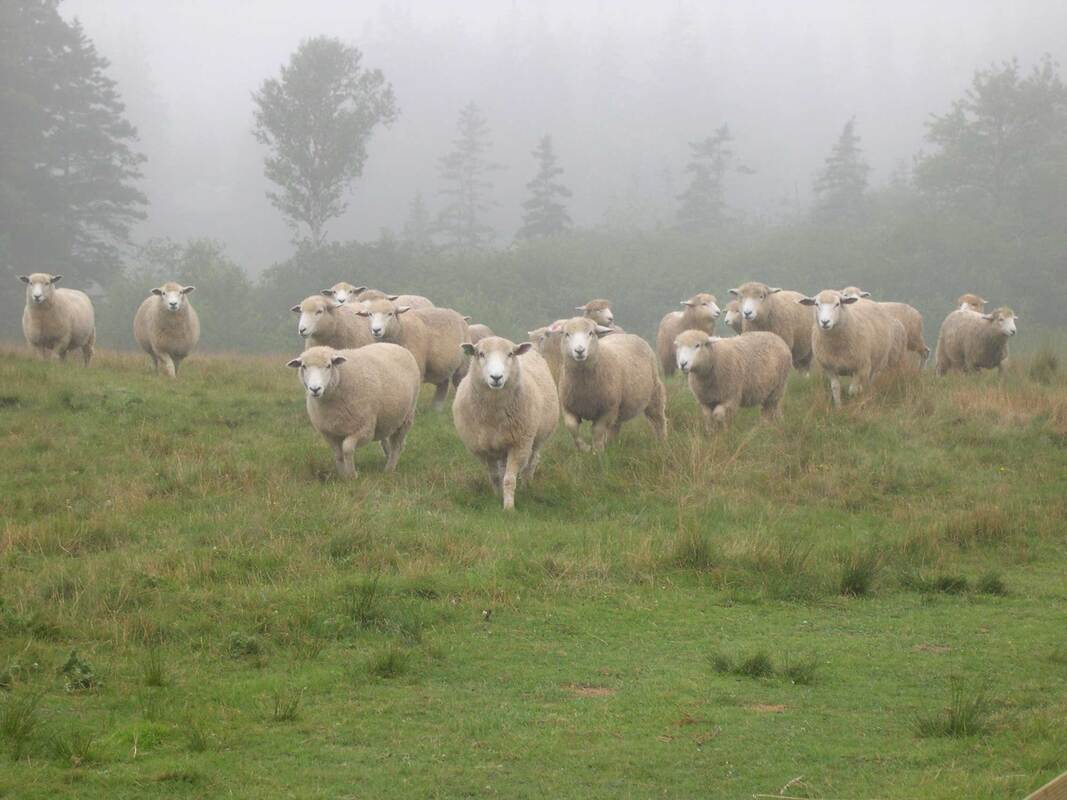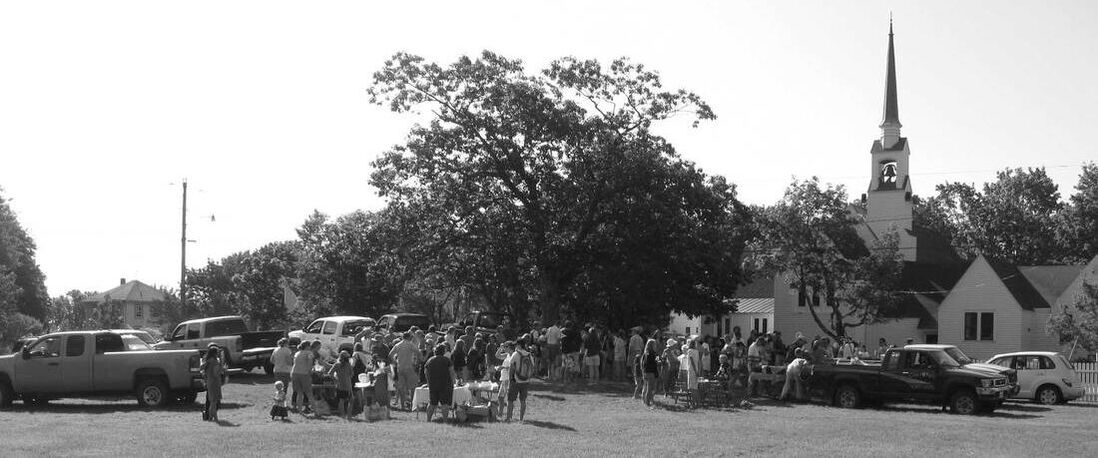MOVING FORWARD
While the community mourned the loss of many North Haven farms during the mid 1900s, farming on the island, as it turned out, seemed to go in cycles and eventually saw a period of revival. The “back to the land” movement of the 1970s, in which young people across the nation left cities in search of rural lifestyles, reached North Haven and generated an interest for reviving the island’s farming traditions. While islanders initially were wary of outsiders who settled on North Haven, they eventually welcomed the new residents through a common interest in farming. Chellie Pingree, who moved to the island in the 1970s, recalled:
The way we worked to be accepted into this community was by becoming farmers. I left a city when I was young and ended up here sort of like a drifter. It was my opportunity to have roots. I wanted to become a traditional North Haven farmer -- you know, raise everything, sell it to the summer people, milk cows, give people what they need, deliver eggs. I can look back now and see how it changed my life. I honestly don’t think I would have become a politician if I hadn’t learned from an egg delivery route how if you want to fit in and to understand what people are thinking, and even have the potential of ever representing or speaking for them, you have to go into their kitchens and figure it out.
Farming continued to grow on the island over the next several decades, occasionally moving through periods of decline and then resurgence. Like the farmers of the island’s past, a new wave of farmers found satisfaction in being able to produce food for their family and community. Sam Cabot remembers when he began farming in the 1980s:
One of the fun things I enjoyed about farming was you could sit down at supper and it was a totally [farm] raised meal. The first time it happened, it was like “This is cool!” All our own vegetables, all our own meat, our own butter, our own milk...In the wintertime, when the ferry didn’t go, when the Thoroughfare froze over for about two weeks, we were all set! We didn’t care! We had milk. We had all the food we needed. We had the woodstove...We were all set!
This new generation of farmers on North Haven not only revived the island’s farming traditions but also restored hope for the vitality of agriculture on North Haven. Islanders grew to recognize that although farming might not return to the scale of the past, it could still persist.
The way we worked to be accepted into this community was by becoming farmers. I left a city when I was young and ended up here sort of like a drifter. It was my opportunity to have roots. I wanted to become a traditional North Haven farmer -- you know, raise everything, sell it to the summer people, milk cows, give people what they need, deliver eggs. I can look back now and see how it changed my life. I honestly don’t think I would have become a politician if I hadn’t learned from an egg delivery route how if you want to fit in and to understand what people are thinking, and even have the potential of ever representing or speaking for them, you have to go into their kitchens and figure it out.
Farming continued to grow on the island over the next several decades, occasionally moving through periods of decline and then resurgence. Like the farmers of the island’s past, a new wave of farmers found satisfaction in being able to produce food for their family and community. Sam Cabot remembers when he began farming in the 1980s:
One of the fun things I enjoyed about farming was you could sit down at supper and it was a totally [farm] raised meal. The first time it happened, it was like “This is cool!” All our own vegetables, all our own meat, our own butter, our own milk...In the wintertime, when the ferry didn’t go, when the Thoroughfare froze over for about two weeks, we were all set! We didn’t care! We had milk. We had all the food we needed. We had the woodstove...We were all set!
This new generation of farmers on North Haven not only revived the island’s farming traditions but also restored hope for the vitality of agriculture on North Haven. Islanders grew to recognize that although farming might not return to the scale of the past, it could still persist.
Today, farms on North Haven again raise vegetables, eggs, lamb, pork, and beef. In addition, they have diversified to produce honey, maple syrup, ice cream, pickles, preserves, sauerkraut, soap, lard, and hand cream, along with yarn, scarves, and blankets made from island wool. Recently, some islanders have turned to another type of farming -- aquaculture -- and are growing oysters, scallops, and seaweed.
Farmers have found a range of ways to market their products almost entirely on island. In the early 2000s, farmers on North Haven established a Farmers’ Market that continues every Saturday in the summer. In addition, farmers sell products through CSA (Community Supported Agriculture) programs and directly from their farm with regular farm stand hours. Island restaurants feature North Haven raised meat and produce on their menus and island stores stock shelves with local farm products. In 2018, the North Haven Brewing Company made beer with honey from an island beekeeper.
Today, North Haven farms are diverse and dynamic. Like farmers everywhere throughout history, they continually adapt to the challenges presented by the natural environment, access to supplies, changing markets, and government regulations. Like farmers of the island’s past, they are both weary from the seemingly endless work and passionate about producing something from the land. They take pride in self sufficiency and in continuing the long-standing tradition of farming on North Haven.
The story of farming on North Haven began in the ground, shaped by the forces of geology and soil formation. Today, the island’s soil and farmers’ access to land continue to shape the path of farming on North Haven. For young people on the island with farming aspirations but no land, the prospect of obtaining property suitable for agriculture is daunting. Real estate prices and property taxes soar far beyond their reach, making it unrealistic for most young people to own farmland on North Haven. In recent years, landowners with arable land who wish to encourage farming on the island have made their property available for gardening or pasture.
As we navigate a path for the future, we must also understand our past. The soil beneath our feet formed over 15,000 years ago and is fragile, nonrenewable, and requires careful stewardship. The land here carries many stories and calls on us to acknowledge them all. From Wabanaki homeland, to occupation by European settlers, to decades of farming, to a shift in land ownership by summer residents, to a resurgence in local agriculture, the stories are here. To move forward requires honoring the stories truthfully and caring for the land continuously.
Farmers have found a range of ways to market their products almost entirely on island. In the early 2000s, farmers on North Haven established a Farmers’ Market that continues every Saturday in the summer. In addition, farmers sell products through CSA (Community Supported Agriculture) programs and directly from their farm with regular farm stand hours. Island restaurants feature North Haven raised meat and produce on their menus and island stores stock shelves with local farm products. In 2018, the North Haven Brewing Company made beer with honey from an island beekeeper.
Today, North Haven farms are diverse and dynamic. Like farmers everywhere throughout history, they continually adapt to the challenges presented by the natural environment, access to supplies, changing markets, and government regulations. Like farmers of the island’s past, they are both weary from the seemingly endless work and passionate about producing something from the land. They take pride in self sufficiency and in continuing the long-standing tradition of farming on North Haven.
The story of farming on North Haven began in the ground, shaped by the forces of geology and soil formation. Today, the island’s soil and farmers’ access to land continue to shape the path of farming on North Haven. For young people on the island with farming aspirations but no land, the prospect of obtaining property suitable for agriculture is daunting. Real estate prices and property taxes soar far beyond their reach, making it unrealistic for most young people to own farmland on North Haven. In recent years, landowners with arable land who wish to encourage farming on the island have made their property available for gardening or pasture.
As we navigate a path for the future, we must also understand our past. The soil beneath our feet formed over 15,000 years ago and is fragile, nonrenewable, and requires careful stewardship. The land here carries many stories and calls on us to acknowledge them all. From Wabanaki homeland, to occupation by European settlers, to decades of farming, to a shift in land ownership by summer residents, to a resurgence in local agriculture, the stories are here. To move forward requires honoring the stories truthfully and caring for the land continuously.


